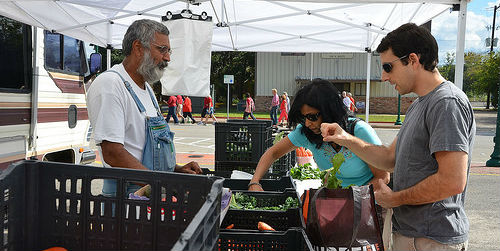May 12, 2020Potential economic crisis from COVID-19 faces farmers’ markets across US
Across the country, farmers’ markets operators – the organizations and individuals who plan, coordinate, and run America’s farmers’ markets, are engaging in herculean efforts to protect their communities from COVID-19.
But even as interest in local foods spikes nationwide, many market operators face the double threat of increased costs to operate during a pandemic, in addition to declining income. To make matters worse, many aren’t eligible for current federal relief efforts.
Farmers markets have always been a hub for innovation. When farmers have opted or been forced out of the traditional supply chain, farmers markets have served as a lifeline to their business, filling a vital role to move their goods from field to plate. Now, in this time of crisis, farmers’ markets are at the forefront of adapting rapid solutions and innovation to protect staff, customers, and community. Apart from these efforts, emerging research suggests sunlight effectively kills COVID-19, adding more support to the idea that farmers’ markets may be the safest place to shop for groceries during the pandemic:
“There are benefits to visiting a farmers market in light of coronavirus in terms of the fact that you’re outside, there’s fresh air moving and the supply chain is shorter,” said Yvonne Michael, an epidemiologist at Drexel University School of Public Health. “…so I would definitely encourage people during the coronavirus to visit a farmers’ market.”
But changes come with both increased costs and decreased revenue for organizations that run farmers’ markets. According to a Farmers Market Coalition member survey, 74% of respondents reported decreased income, while 93% report added costs, including the purchase of PPE for market staff, rental of more hand-washing stations, new software or services, and additional staff to rearrange market layouts and monitor customer traffic.
The need to reduce the number of vendors to enforce physical distance requirements, while other vendors are unable to attend markets due to health concerns, age, and labor shortages, points to a steep decline in revenue for market organizations. In a similar survey by the California Alliance of Farmers Markets, nearly 20% of respondents reported concern that they may not survive the economic impacts of COVID-19.
“We expect to lose almost $200,000 by the end of the year” said Kate Creps, Executive Director of the Heart of the City Farmers Market, in San Francisco, an organization that distributes $1.5 million in food assistance through its markets each year. “Only 50% of our vendors are able to continue selling during this crisis. At the same time, we anticipate over $60,000 in additional expenses to maintain strict social distancing protocol to protect customers, vendors, and staff.”
To make matters worse, farmers’ markets operators have largely been left out of relief efforts, both public and private. “Farmers’ markets are probably the safest place to shop now, but that hasn’t happened by accident. It’s thanks to the committed efforts of the community based farmers’ market operators who deliver for their communities,” said Ben Feldman, Executive Director of the Farmers Market Coalition, a nonprofit representing 4,500 farmers markets across the country. “These are very lean organizations and we are close to a breaking point for many of them, especially if they continue to be shut out of support other sectors of the economy are receiving.”
The impact of losing farmers markets would be massive. Farmers markets facilitate an estimated $2.4 billion dollars in sales for farmers each year. “Without direct assistance for our state’s farmers markets, many of which already operate on a shoestring budget and an all-volunteer staff, we risk losing this vital outlet, drastically affecting the livelihoods of farmers,” according to Robbi Mixon, a farmers market manager and Director of the Alaska Farmers Market Association. “Small to medium scale farmers are the cornerstone of local food systems. If farmers markets disappear, these farmers lose market access and economic stability”
“We are imploring state and federal governments to keep farmers markets in their mind as they develop relief packages,” said Feldman. “Please help markets keep their communities safe and thriving.”















